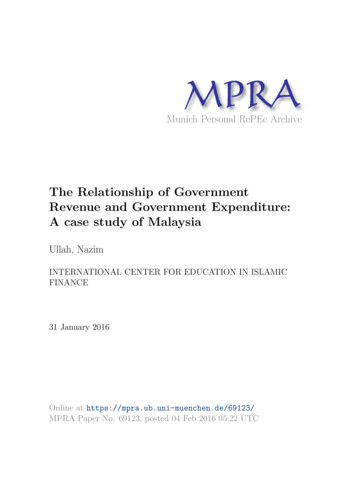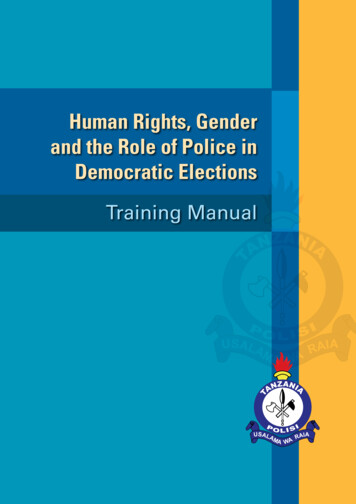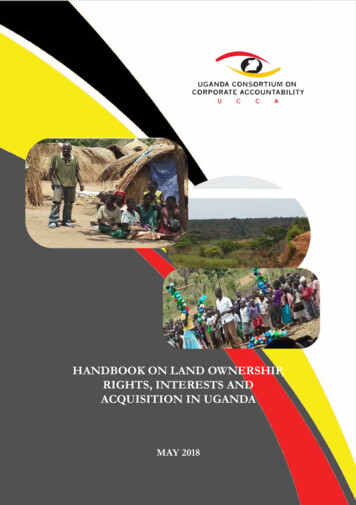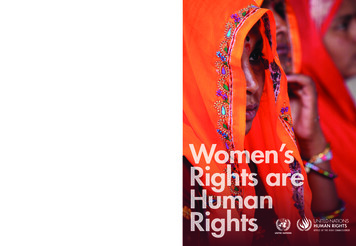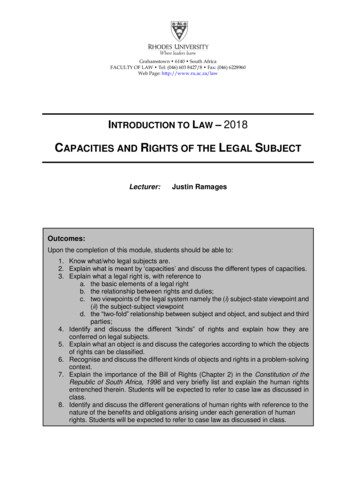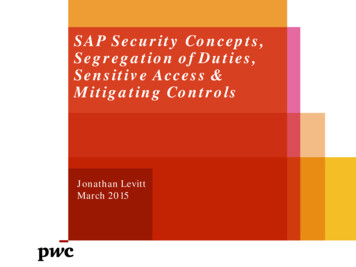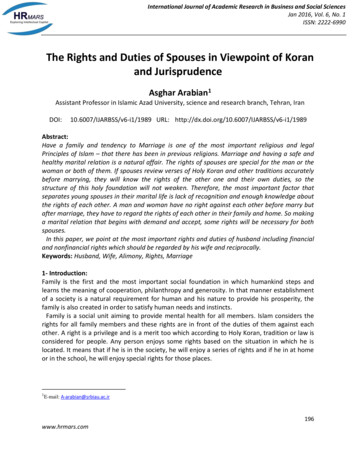
Transcription
International Journal of Academic Research in Business and Social SciencesJan 2016, Vol. 6, No. 1ISSN: 2222-6990The Rights and Duties of Spouses in Viewpoint of Koranand JurisprudenceAsghar Arabian1Assistant Professor in Islamic Azad University, science and research branch, Tehran, IranDOI:10.6007/IJARBSS/v6-i1/1989 URL: ct:Have a family and tendency to Marriage is one of the most important religious and legalPrinciples of Islam – that there has been in previous religions. Marriage and having a safe andhealthy marital relation is a natural affair. The rights of spouses are special for the man or thewoman or both of them. If spouses review verses of Holy Koran and other traditions accuratelybefore marrying, they will know the rights of the other one and their own duties, so thestructure of this holy foundation will not weaken. Therefore, the most important factor thatseparates young spouses in their marital life is lack of recognition and enough knowledge aboutthe rights of each other. A man and woman have no right against each other before marry butafter marriage, they have to regard the rights of each other in their family and home. So makinga marital relation that begins with demand and accept, some rights will be necessary for bothspouses.In this paper, we point at the most important rights and duties of husband including financialand nonfinancial rights which should be regarded by his wife and reciprocally.Keywords: Husband, Wife, Alimony, Rights, Marriage1- Introduction:Family is the first and the most important social foundation in which humankind steps andlearns the meaning of cooperation, philanthropy and generosity. In that manner establishmentof a society is a natural requirement for human and his nature to provide his prosperity, thefamily is also created in order to satisfy human needs and instincts.Family is a social unit aiming to provide mental health for all members. Islam considers therights for all family members and these rights are in front of the duties of them against eachother. A right is a privilege and is a merit too which according to Holy Koran, tradition or law isconsidered for people. Any person enjoys some rights based on the situation in which he islocated. It means that if he is in the society, he will enjoy a series of rights and if he in at homeor in the school, he will enjoy special rights for those places.1E-mail: A-arabian@srbiau.ac.ir196www.hrmars.com
International Journal of Academic Research in Business and Social SciencesJan 2016, Vol. 6, No. 1ISSN: 2222-6990As the subject of this paper is related to marital life, knowing marital rights will prosper therelation between spouses . Family is the foundation of society and the structure re of society isestablished on families. More stable foundations will strengthen the structure.This situation will be provided by recognizing the rights and also duties of each other.2- Conceptualization:2-1- Rights:Right means collation, equality, coordination and honesty; such as a door which moves overits pivot firmly and correctly )Esfahani ,1991).Rights is the plural form of “right” and can be referred to anti-evil, a certain affair, justice,properties, wealth and permanent creature(Al-Shartooni, 1991).2-2- Jurisprudence:Jurisprudence is a collection of Islamic religious principles and rules to make a relationbetween Muslims with their great God and also with their society. In the culture ofKoran, jurisprudence means insight and intelligence and also accurate understanding (Toosi,2008).2-3- Spouses:“Spouses” refers to husband and wife and also means “type and species” (Qomi, 2006).Ragheb writes in “Mofradat” (solitaries): Spouses refers to both husband and wife. “Zoujeh”(female form of Zouj which means husband) should not refer basically to “wife” According toholy verse:» ( «هو اللذی خلقکم من نفس واحده و جعل منها زوجها He is who that created all of you from one humanand created also his wife from his type) (Holy Koran), the word “Zoujoha” (his spouse) does notrefer to Eve, rather the verse says that the origin of all people is a couple that none of which issuperior than the other from human viewpoint of nature.2-4- Disobedience:“Noshooz” (disobedience) means “height” “نشز الرجل . (Ibn-Manzoor, 1993)” means: Whilesitting, the man stood up. This meaning is referred too in Holy Koran. This word is also referredto explain disobedience of men and women from their duties against each other (Holy Koran).This idiom is used when the man or woman refuses his or her duties.2-5- Financial rights:“Financial rights” is an advantage that is donated by the law of each country to providefinancial requirements of people (Khosroshahi, 2006).2-6- Non-financial rights:The target of these rights is to remove sympathetic and moral requirements (Khosroshahi,2006). The subject of non-financial rights is non-financial relations between the members ofsociety that has no business value and cannot be evaluated directly as finance (Emami, 1996).197www.hrmars.com
International Journal of Academic Research in Business and Social SciencesJan 2016, Vol. 6, No. 1ISSN: 2222-69903- Rights of husband:3-1- Financial rights of Husband:3-1-1- InheritanceInheritance means survival and remainder of something. “Inheritor” ( ) وارث is one of thenames of God that means “constant”.Among the far periods of history during which humankind started his social life by organizingfamilies and recognized personal ownership, inheritance has been a subject to definedestination of properties after the death of human. The relation between spouses is a casualrelation and spouses become a family after marriage (Emami, 1996). This casual relation is aninterest between two people that is caused by marriage, so a husband and wife will be partnerin their properties. Inheritance is a financial aspect that is considered as a right. Inheritance isalso interpreted as patrimony of the dead which is rooted in verses of Koran: " ولکم نصف ما ( ترک ازواجکم Holy Koran).So, patrimony is the part of heritage of the dead which remains after lessening debts, wills,identical rights and expenses of shrouding and burial. So it will be synonym with heritage (IbnAbedin, 1993).Holy Koran says: “For men there is a share in properties of their fathers and mothers andother relatives and for women there is also a share in properties of their fathers and mothersand other relatives, weather less or much, this share is defined and should be paid” (HolyKoran). In this verse, “women” does not refer to “men” although it should be. But Koran ordersfor women in a separate sentence to indicate independency of women to inherit just like themen (Al-Showkani, 1964).Islam defines the principles of inheritance on three bases:A) Coordination of principles of inheritance with natural interest to properties, children andrelatives.B) Distribution of wealth and decentralization.C) Righteously distribution based on requirements.3-1-1-1- Inheritance share for husband:Holy Koran has described inheritance share of husband and its terms in details. The amount ofinheritance share of husband is various if he has a curtain inheritor or not. “curtain inheritor” isthe inheritor who is deprived of inheritance, little or much, because of a another inheritor. Theinheritor who is the reason of this situation is called “Hajeb” (curtain inheritor ) حاجب . Forexample, children are hajebs who decrease inheritance share of their father from maximum tominimum level. So if a couple has not a child, husband inherits half of properties of wife and ifthey have children, husband inherits a quarter of properties of his wife. Holy Koran announceshusbands and says: “and you inherit half of properties of your wives and if you have children, soyou inherit a quarter of her properties after providing the will of your wives and their debts”(Holy Koran).Those whose inheritance share is defined in Holy Koran are called “presumed ones” (FarzBar ) بر فرض . Farz means “to measure” and the share of each inheritor is a sample of Farz198www.hrmars.com
International Journal of Academic Research in Business and Social SciencesJan 2016, Vol. 6, No. 1ISSN: 2222-6990(Jafari Langeroodi ,1993). Those whose inheritance share is defined are called: presumed ones(Farz- Bar).About inheritance share of husband from his wife, three types are conceived in alimony whichare described here:First type: The inheritors are both husband and children of wife.Second type: the inheritor is the husband and there is no other first grade relative but assecond grade relatives, there are grandmother, grandfather, uncle, Third type: The dead has only her husband as inheritor.Saheb-Jawaher describes these three types and defines inheritance share as following: In firsttype, the share of husband in one fourth. In second type the share of husband is the half. Inthird type, if husband is the only inheritor and there is no other casual relative or relative-in-lawinstead of Imam, the share of properties will be inherited by her husband and the other half willreturn to husband too (Najafi, 1981).Imam Khomeini in Tahrir al-Vasileh describes these three types too and agrees with SahebJawaher (Khomeini, 1964).It should be considered that according to verses of Koran and subjective principles aboutdistribution of inheritance after performance of her will and payment of her debts, such thesewills and debts include:1- The price of the wrapping sheet to cover body of the dead that is included inresponsibilities of inheritors such as mortgage.2- Debts and financial obligations of the dead.3- Will of the dead up to one third of inheritance without the permission of inheritors. Morethan one third should be according to permission of inheritors.These rights should be provided in an assigned order and the rest should be divided if there isany (Kamalan, 2009). It should be mentioned that if inheritors trade with inheritance, thesetrades will not be correct and lawful if the debts of the dead are not paid and creditors cannullify the trades (Kamalan, 2009).3-1-2- Receipt of ransom in Khol’a Divorce (divorce granted at a woman’s request againstCompensation )خلع As men are empowered to make a divorce, there is another kind of divorce in which the wifecan request for divorce because of severe aversion against her husband. This kind is called“Khol’a Divorce”. To use Khol’a divorce, the wife – in addition to sever aversion – should pay aproperty to her husband to satisfy him for divorce (Najafi, 1981).Some believe that Khol’a Divorce in jurisprudence is dissolution of marriage but most of thembelieve that it is a kind of divorce (Qomi, 1992). Divorce has two types: 1- revocable divorce, inwhich the man is allowed to return 2- irrevocable divorce, in which husband is not allowed toreturn at all. Irrevocable divorce has various types, one of which is Khol’a divorce. “Khol’a" ( ) خلع means to excavate and to depose. Holy Koran says: “ فاخلع نعلیک take out your shoes”(Holy Koran). Khol’a divorce refers to the situation in which the woman intends to separatefrom her husband. In this kind of divorce, woman pays a property to her husband against heraversion to take her divorce (Ibn-Manzoor, 1993). This property may be equal with her dowry,199www.hrmars.com
International Journal of Academic Research in Business and Social SciencesJan 2016, Vol. 6, No. 1ISSN: 2222-6990less than dowry or more than it (Kamalan, 2009). In Khol’a divorce, the husband is called Khale ( ) خالع and the wife is called Mokhtale ( ( (مختلعه Najafi, 1981).In such a divorce, woman cannot continue her marriage life and hates her husband. Such thishating is not enough for divorce but is a required element (Bahrani, 1985). Ransom is aproperty which the wife pays to her husband to make him satisfied for divorce. It also isreferred to the property which a captive pays to be released. This kind of property is amongspoils of war. This property is a right for husband; unless he refuses to receive it (JafariLangeroodi,1993).There is no limitation to define the amount of ransom in Khol’a divorce. So in Khol’a divorcesomething should be paid but it is not a provision to make a divorce. If after Khol’a divorce, thewife refers to property that she has paid to her husband, the Khol’a divorce will be revocabledivorce not irrevocable (Kamalan, 2009).3-1-3- Financial condition for marriage:Couple can define some conditions while marrying. Such conditions during marriage are jointrights between couple. It means that couple is allowed to use this right. Financial conditions canbe defined by husband while marrying his wife. The husband can profit him or his wife in suchthese conditions.So, one of the rights and financial conditions of husband while marrying his wife is to definethat dowry is payable by husband only if the husband is capable to pay. It means that husbandmakes this condition that he will pay dowry to his wife only if he has financial capability,although dowry is payable on demand. As definition of dowry in permanent marriage occurswhile couple enter into marriage, such this condition is financial and is not against the nature ofmarriage and does not harm the relationship between spouses . As above-mentioned methodin capability of husband to pay dowry, it is possible to make the condition while marrying thatdowry should be paid to wife on demand (Kamalan, 2009).While marrying, husband can agree and make the condition that working of wife during theirmarried life will be voluntary. In other words, any financial condition between husband andwife is the reason to prevent the wife to demand for her wage against working at home, eithersuch this condition is in married period or out of married period (Hedayat Nia ,2006).Sometimes husband makes a condition to bisection his properties by his wife if he marries forsecond time (Katoozian, 1992). These conditions are predicted due to financial independency ofhusband and agreement of couple. As these conditions have financial loads, husband is lawfulto mention them after agreement with his wife or disregard them.3-1-3-1- The Principle of Free Agreements:1- According to verses, taking possession of properties of others through unlawful ways isprohibited. Trading along with agreement is exempted from this rule. So, if the trade isregistered by agreement of parties, it will be a correct and lawful trade.2- According to verse 1 from Maedeh Surah, Muslims are ordered to be loyal to theiragreements. As these agreements include any form such as purchase, rent, marriage, etc, so200www.hrmars.com
International Journal of Academic Research in Business and Social SciencesJan 2016, Vol. 6, No. 1ISSN: 2222-6990any kind of reasonable trade which enjoys basic conditions of a true agreement, is the subjectof this verse and should be performed.3- According to the famous tradition of Holy Prophet of Islam who said that peopleare authorized over their own properties, everybody is lawful to possess his ownproperties in any desirable way.4- According to this tradition: “Muslims are loyal to their conditions”, so Muslims shouldregard their conditions and commitments. If they conclude an agreement, they will not beauthorized to nullify it with no particular reason or without agreement of second party (HorrAmeli, 1983).3-2- Non-financial Rights:3-2-1- Divorce:In Islam, husband is lawful to divorce his wife and according to law, a man is authorized todivorce his wife whenever he wants (Kamalan, 2009). There are many verses in which divorce isa right for men and there is not even one item to let women make divorce. Divorce is special forpermanent marriage (Kamalan, 2009) and in temporary marriage there is no divorce. Intemporary marriage, the woman will not be the wife of a man if her marriage contract isexpired or is granted by her husband. In religious idioms, divorce is “to remove marriage with aspecific agreement” (Najafi, 1981). Divorce, in fact, dissolves marriage. Islam always prohibitsMuslims to divorce and believes that the effects of divorce are destroying. In a tradition of HolyProphet of Islam we read: “No action is more hated near God than the destruction of a familyby divorce” (Horr Ameli, 1983).In order to reduce the rate of divorce, although Islam lets men to divorce their wives, but itleaves the heavy responsibilities to make their living and payment of dowry for men andprevents illogical and shallow divorces. It is also possible for women to make condition aboutdivorce while marrying their husbands or deprive them from this right (Khamenei, 1996).3-2-2- Right to Revoke“Revoke” means to return and to dispense and idiomatically means the man who divorces hiswife (Ibn-Manzoor, 1993), is rightful to revoke to her again, either he returns or not (HorrAmeli, 1983). The right to refer exists in revocable divorce and means that the husband, duringperiod of eddeh (period during which a divorced woman may not be married with another man)and without remarriage can return to his wife and live with her again because during this periodthe woman is the wife of man (Qomi, 1992). Revoke in the law is a legal unilateral measure andis, in fact, a cadence which is done by words or by action (Kamalan, 2009). In Islam any revokein order to injure a woman is forbidden. According to verses of Holy Koran, revoke should bewith good intention. In revocable divorce, if husband intends to return, he should revoke duringeddeh period (Kamalan, 2009). Right to revoke will be offered to a man after divorce. Accordingto explicit words of Holy Koran: “Their wives will be more worthy to revoke and start marryinglife again, if they (men) really intend to reform” (Holy Koran).Revoke during eddeh does not require remarriage or any official stages such as acceptanceand recording marriage or presence of notary or clergy. But if a couple decides to revoke after201www.hrmars.com
International Journal of Academic Research in Business and Social SciencesJan 2016, Vol. 6, No. 1ISSN: 2222-6990expiration of eddeh, they should marry again. Holy Koran in such this case believes that thehusband is more worthy to revoke and advises the others strictly not to interfere in their life.Jurisprudents believe that the reality of revoke is to return to marriage which is a new affair.Any new affair requires a reason which here is forgery of legislator (Al-Soyuri, 1984).In revocable divorce, the right to revoke is saved for husband and he is more worthy to return.So the intention of husband should be real with good intention to continue their life together.3-2-3- Remarriage:One of the admirable customs in Islam is “polygamy” that roots out many of the socialcorruptions. In other words, those men who have enough financial and other properties andare able to behave righteously between their wives, may not let some women remain single inan Islamic society. Not only Holy Koran and traditions refer to this subject, but also it is one ofthe certain religious affairs. The Exalted God lets men in Holy Koran to have four permanentwives (Makarem Shirazi, 1987).Although this verse announces supervisors of orphans and orders them either to marry withorphan girls and regard justice or ignore them and select their wives among other women, butthe verse addresses all Muslims and told them to ignore orphan girls to marry to avoid oppressthem and marry with those women whose social and family situation does not let you oppress.You are allowed to take two, three or four wives (Makarem Shirazi, 1987).Despite explicit words of Koran, jurisprudents also believe that marrying with four women at atime is right, but those who have four permanent wives are not authorized to marry the fifthwoman, unless one of four wives dies or divorces and her eddeh period ends. A man can havefour permanent wives at a time and many temporary wives.Saheb-Jawaher describes the story of a tribe in Zeidieh who believed that nine permanentwives are legal and says: “According to necessity of religion or reunion of jurisprudents,marrying with more than four women permanently is not allowed if all of them were alive andin marriage (Najafi, 1981). Sahiheh Zarrareh and Mohammad Ibn Moslem quoted from ImamSadegh (P.B.U.H) that: “If a man divorces one of his four permanent wives, he will not beallowed to marry the fifth wife unless the eddeh period of divorced wife is over” (Jahangiri,2009).3-2-4- Guardianship (management of family):Being created through the relationship between couple as a small society, a family requiresmanager and guardian to manage its affairs. In Islam, the man is manager of family. Holy Koransays: “Men are guardian of women due to superiorities of some bodies over the others (insocial discipline) and also due to sustaining some part of their properties to women” (HolyKoran).Allameh Tabatabaei interprets this verse and says: “Woman is independent to manage herpersonal affairs and if she does any good or bad deed which she desires, the man will not beallowed to object her. The meaning of guardianship is not that a woman has no right to performher personal affairs and cannot resort her rights to achieve her independency.202www.hrmars.com
International Journal of Academic Research in Business and Social SciencesJan 2016, Vol. 6, No. 1ISSN: 2222-6990This verse, in fact, defines the situation of men in human life and marital life against theirwives, not the authority of men over the women and does not prove dependency of women”(Tabatabaei, 1984).3-2-4-1- Necessitation to assign a head for familyThe governorship of an authority over a society is required to establish order and disciplinethere. Families are not exempted from this rule and assignment of a head is necessary toguarantee continuation of family. Personal rights say that equality of man and woman is morerighteous and it may be claimed that a family should be managed jointly with husband andwife, and the discipline of family is based on coordination of man and woman. But social life inany group requires its special necessities to remove them, personal freedoms should be limited.Some jurisprudents pay attention to authority of father over his children and say: “If harddiseases prevent a man to provide his family financially, his guardianship and authority will bedisappear” (Al-Karaki, 1988).So the purpose of guardianship of husband is that total decisions should be taken by husbanddue to regarding advantages of family. This authority is granted to the man for interest andadvantage of family.3-2-5- Obedience:Obedience means authority and empowerment (Mostafavi, 1981). In Holy Koran is said: “Weplaced them on the earth and made them the owners of earth”.The Saheb-Jawaher believes that obedience is sexual method between husband and wife andlack of disobedience is ascertained through this principle. It includes any time and place inwhich enjoyment is Halal (legitimate) (Najafi, 1981).In Islamic description of “obedience” it is called that: Obedience of wife from her husband(Soyuti, 1991). Jurisprudents say: “The obedience of wife means that she leaves herself free forher husband everywhere and every time, except for forbidden situations such as menstruation,Hajj or disease. So the subject follows time, place and family customs” (Jafari Langeroodi,1993).Obedience of wife is an effect of management of husband (Qomi, 1992). Disobedience is antiobedience that means lack of obedience, either in enjoyment or in other situations such asworking in a position which is inconsistent with family prestige of man (Kamalan, 2009).3-2-5-1- Types of Obedience:Obedience has two various types: particular obedience and general obedience.Particular obedience means that wife has an ordinary sexual relation with her husband, unlesswhen she has a reasonable prevention. Particular obedience is not special for woman andhusband should have regular sexual relationship with his wife to remove sexual needs of hiswife. Particular obedience is emphasized too much in Islam and it is said that by Holy Prophet ofIslam: “Do not prolong your praying, not to prevent your husband from pleasure” (Koleini,1981).According to description of obedience and disobedience, followings are not disobedience andthe wife is not disobedient:203www.hrmars.com
International Journal of Academic Research in Business and Social SciencesJan 2016, Vol. 6, No. 1ISSN: 2222-69901- Having anus sexual relation2- Taking a trip with permission of husbandGeneral obedience means that woman performs her duties against her husband according tothe law and common principles and accepts management of husband (Safaei, 2001).Unfortunately some religious books and some jurisprudents have not paid any attention tosexual pleasure of woman and believe that marriage is only sexual pleasure of man anddescribe sexual pleasure as a unilateral enjoyment. It is quoted from Hanaffieh that womenhave the right of sexual pleasure only for one time in their lives and if the men reject them,women are not lawful to object (alJaziri, 1989).Although Malekieh believes that marriage is a contract to make the man pleasant sexually, buthe deems it necessary for man to provide sexual pleasure for woman unless there is an excuse.Nowadays family is seen in different forms which each one is considered as a social culturalsystem. Inside such a system, individuals are tied with each other by strong, mutual and durableaffective links. Entering into this organized system is accomplished through birth or marriage(Keikhah 2011.The common advice among Shiites says that it is not permissible for husband to leave sexualrelation with his wife for more than four months. In fact, those who accept this idea, alsobelieve that sexual pleasure is specific for men and the right of women is too little, althoughthey believe that provision of requirements of women is also recommended (Tabarsi, 1987).Shahid Sani in Masalekol-Afham believes that all jurisprudents are common in this opinion. Inother religious books such as Sharh al-Lom’e, Kashf al-Lesm and Javaher al-Kalam, this opinionis attributed to most of the jurisprudents. Between Islam and the Law Between citizenship andcivil rights of any other spiritual tradition established relationship breakdown is inevitable(Abdolrahimi, 2012).In religious books, obedience is one of the duties of women and nothing is said aboutobedience of men. Having sexual relation with wife, is one of the rights of husband and wifemay not prevent her husband to enjoy, unless there is a religious or reasonable excuse. Theproblems which prevent a woman to have sexual relation are as following:1- In Ramadan while the woman fasts.2- In Hajj while the woman worships God.3- While the woman is in menses or childbirth. In opinion of jurisprudents, since thefirst part of body of child is being given birth, every blood will be blood ofchildbirth if it is not stop after ten days. In this situation, woman is called “Nafsa” (Khomeini,2006).3-2-6- Sociability:Sociability is one of the important affairs to which people require either in society or in family.It is interpreted too as emotional and moral need. Sociability is a general concept whichincludes various and undefined meanings. Of course such these subjects can not be described inspecific frames and no exclusive meanings can be defined for them, because such thesesubjects depend on time and place custom. So, the possibility to coordinate the meaning ofsuch these concepts with situation of time and place should be provided (Davar, 2001).204www.hrmars.com
International Journal of Academic Research in Business and Social SciencesJan 2016, Vol. 6, No. 1ISSN: 2222-6990Holy Koran introduces sociability as a right for women and obliges men to have good behaviorwith their wives (Holy Koran). It should be mentioned that husband should be sociable tosupport bases of family because a man and woman conclude a wedding contract intentionallyto reach such these targets. Establishing a family is not enough and good behavior of couple isrequired to provide peace and tranquility for higher purposes such as training gentle childrenand duration of family. This good behavior is called sociability. If we suppose that the verse ofsociability is specialized only for women, they will have no responsibility against their husbandsto have good behavior and women can refer to this verse and have bad behavior. Followingsmay be mentioned among evidences of sociability: sexual relation, obedience, trustworthiness,confidence, good behavior, cooperation, attention to each other, respecting each other,consultation, kindness, living together, (Katoozian, 1992). Leaving family, inattention to spouseand his or her demands are some items of bad behavior.In Islamic traditions, sociability is a reason to increase life length. Imam Sadegh (P.B.U.H) says:" " و من حسن بره باهله زاد هللا فی عمره that means: "Who behaves with his or her family in agood manner, God will increase his or her life" (Majlesi, 1983). The parameters of sociabilitycannot be defined accurately but any action which is considered an insult from social viewpointis a parameter of bad behavior such as cursing, beating, quarreling, abasement and etc(Katoozian, 1992).The word of "Maroof" ( معروف good or lawful) means a well known, reasonable and goodaction and is repeated 12 times in Holy Koran and this series of verses to warn men and womennot to abuse their rights and instead, respect each other to strengthen their family and tosatisfy God.Imam Ali (P.B.U.H) recommended his children in his will at the end of his life to have"sociability". In a tradition by Imam Mohammad Bagher (P.B.U.H) is said: "While passing away,Imam Ali (P.B.U.H) called his children and recommended: "My dear sons and children, live andbehave with people in a manner that they eager toward you when you are not among themand cry for you when you die (Majlesi, 1983). This valuable tradition says that Imam Aliexpresses the necessity of sociab
مکجاوزا کرت (Holy Koran). So, patrimony is the part of heritage of the dead which remains after lessening debts, wills, identical rights and expenses of shrouding and burial. So it will be synonym with heritage (Ibn-Abedin, 1993). Holy Koran says: “For men there

